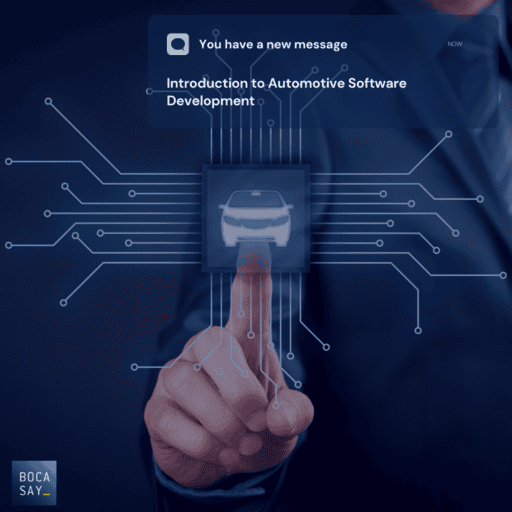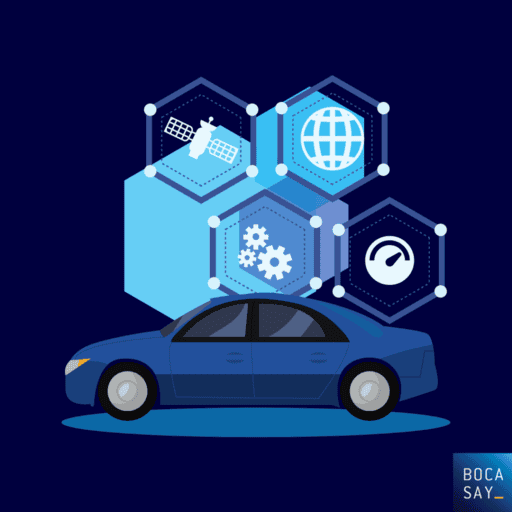Introduction to Automotive Software Development
As the automotive industry invests in the development of software-defined vehicles, car owners can expect more electrification, automation, optimization and personalization.
Driven by digital technologies and smart software development, future vehicles have the potential to significantly benefit from next-level security, comfort and convenience.
Without robust software solutions, contemporary automakers can face major business risks such as start-of-production delays, overstretched budgets and fierce competition.
Moreover, issues with software can lead to mass recalls of problematic products, or leave car companies vulnerable to customer-safety risks resulting from hacking attacks.
In this article, Bocasay, an offshore outsourcing company, explains the basics and continues with an overview of the latest trends within the automotive software development industry.

What is Automotive Software?
Automotive software is specifically designed in order to transform and support the operation of a motor vehicle. Not limited to cars only, some of the same technological advancements are also used in trucks, ships and even aircraft.
Embracing the drastic digital transformation that has swept the globe in recent years, the industry is evaluating and benefiting from combining data management and vehicle operation.
Redesigning all internal systems like engines and central consoles, the primary achievements of automotive software development include streamlined key entries, fuel efficiency, entertainment, ease-of-use, as well as a more comfortable and secure driving experience.
At its most basic, automotive software is a cloud-based solution that is essentially connected to a vehicle’s hardware over an internet connection.
𝔻𝕠𝕟’𝕥 𝕓𝕖 𝕒𝕗𝕣𝕒𝕚𝕕 𝕠𝕗 𝕔𝕙𝕒𝕟𝕘𝕖! 𝔼𝕩𝕡𝕝𝕠𝕚𝕥 𝕥𝕙𝕖 𝕡𝕠𝕥𝕖𝕟𝕥𝕚𝕒𝕝 𝕠𝕗 𝕪𝕠𝕦𝕣 𝕓𝕦𝕤𝕚𝕟𝕖𝕤𝕤 𝕨𝕚𝕥𝕙 𝕔𝕦𝕤𝕥𝕠𝕞𝕚𝕫𝕖𝕕 𝕕𝕚𝕘𝕚𝕥𝕒𝕝 𝕤𝕠𝕝𝕦𝕥𝕚𝕠𝕟𝕤! 𝔹𝕠𝕔𝕒𝕤𝕒𝕪 𝕠𝕗𝕗𝕤𝕙𝕠𝕣𝕖 𝕠𝕦𝕥𝕤𝕠𝕦𝕣𝕔𝕚𝕟𝕘 𝕔𝕠𝕞𝕡𝕒𝕟𝕪 𝕨𝕚𝕝𝕝 𝕙𝕖𝕝𝕡 𝕪𝕠𝕦 𝕚𝕟 𝕪𝕠𝕦𝕣 𝕕𝕚𝕘𝕚𝕥𝕒𝕝 𝕥𝕣𝕒𝕟𝕤𝕚𝕥𝕚𝕠𝕟. ℂ𝕠𝕟𝕥𝕒𝕔𝕥 𝕠𝕦𝕣 𝕥𝕒𝕝𝕖𝕟𝕥𝕖𝕕 𝕥𝕖𝕒𝕞𝕤 𝕟𝕠𝕨!
Why is Automotive Software Development necessary?
Deploying the dynamics of artificial intelligence and machine learning, vehicle software development offers a wide range of opportunities and benefits both for companies and their clients. The following are some of the key software development areas for the automotive industry:
- Processing dynamic customer expectations.
- Developing and deploying new vehicle functionalities.
- Ensuring reliable and safe transport operations.
- Meeting specification requirements through rigorous testing.
- Providing remote vehicle health diagnoses and fleet management.
- Securing remote access to key vehicle data from anywhere.
- Enabling remote car firmware updates.
- Developing efficient vehicle tracking software.
- Delivering vehicle navigation software for professional drivers.
Top Benefits of Automotive Software Development
Accident Reduction
Above all else, operating any type of vehicle requires the highest levels of safety, both from the manufacturer’s perspective , as well as for the end-user. Embedded sensors and dedicated automotive software can ensure that digital cars will be much safer overall, especially when compared with traditional automobiles.
It is widely known that drivers are responsible for the majority of car collisions. Combatting common driver errors, technology can help us significantly reduce everyday car accidents. Automated early warning systems can prevent drivers from veering into another lane, and advanced car control systems can initiate braking or steering in order to avert collisions.
Predictive Maintenance
Regular vehicle maintenance is crucial not only for reducing an owner’s annual operation costs, but also as a process that can prevent road accidents or your car from getting stuck in the middle of nowhere.
Automotive software can let you know when your car’s tyres require more air or when your vehicle needs more water in order to avoid overheating. Embedded sensors provide real-time data for every aspect of the vehicle’s operation.
By being notified about upcoming malfunctions in real-time, a vehicle-owner can make smarter and faster decisions that reduce maintenance costs and establish a safer driving experience.
Smart Diagnostics
With cars increasingly containing millions of lines of code and run by smart software, it is now possible to significantly reduce the time your car needs to spend at the mechanic’s garage.
Traditionally, car mechanics can spend a significant amount of labor time just to identify what your vehicle’s problem is. For example, a small malfunctioning component might have required the disassembling of an entire car engine before the problem is identified.
With smart diagnostic software for cars, a mechanic can almost instantly identify a problematic component, significantly reducing labor time and overall costs for the vehicle-owner.

Customer Service
Today’s car owner, already accustomed to the flexibility offered by e-commerce, expects to have more control over buying and owning a vehicle.
An ‘always-on’ connection to car dealerships, with instant messaging for inquiries, is fast becoming standard practice. A potential buyer must be able to use any device in order to communicate with a seller anytime and anywhere.
Automotive software enables fast and seamless business-customer interaction that ultimately boosts customer satisfaction. Nowadays software is being used to arrange test drives, discuss car finance plans and to select vehicle maintenance service plans.
Fuel Efficiency
Energy savings and efficiency are particularly important for companies that have to manage fleets of transport vehicles for their products. Automotive software development can provide fuel cost savings, by :
- Making cars and trucks more fuel-efficient.
- Identifying ‘problematic’ drivers.
- Tracking fuel use.
- Pin-pointing fuel-wasting activities.
This type of software can help companies to monitor fuel consumption for large fleets, and to optimize their product routes to ensure low carbon emissions and fuel efficiency.
Whether it’s smart cruise control that improves fuel usage by controlling vehicle acceleration and deceleration, or optimized engine settings with dedicated fuel-reducing parameters, software plays a key role in vehicle energy efficiency.
Autonomous driving
Worried about your teenage son or elderly parents driving your luxury car? Once driverless cars reach mainstream application, all these worries could soon be a thing of the past. A digitized autonomous vehicle will rely on a series of smart embedded sensors to safely drive itself in all road conditions and situations.
Benefits include:
- Improved road safety.
- Optimized transport interconnectivity.
- Reduced road congestion.
- Reduced pollution and emissions.
- Greater convenience and reliability.
In the UK, for example, the government plans to support the implementation of driverless cars for as early as 2025.